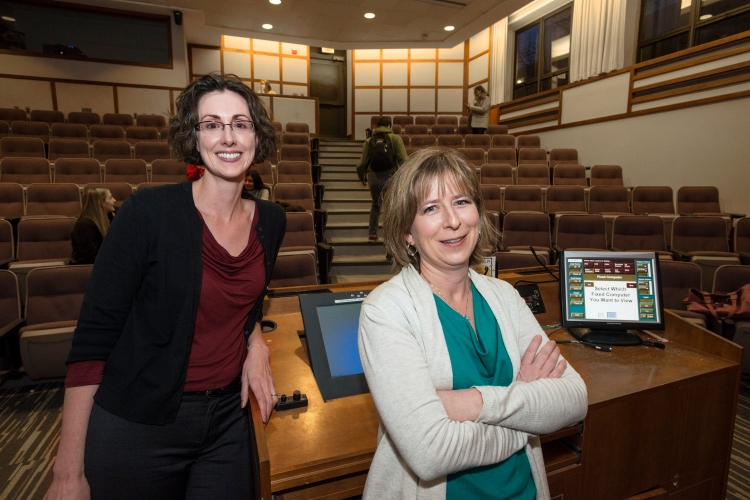
By
In an increasingly global society, where health problems – and their potential solutions – often have implications far beyond the communities in which they occur, public health is fast becoming a field of great interest among colleges and universities. Boston College is a leader in training this new generation of internationally-minded problem solvers through its program in Global Public Health, offering undergraduates interdisciplinary coursework via a collaboration between the Lynch School of Education, Connell School of Nursing, and School of Social Work.
This semester, 67 students have been enjoying the unique opportunity to take a course team-taught by Social Work Assistant Professor Summer Hawkins and Nursing Assistant Professor Melissa Sutherland.
Public Health in a Global Society, the first installment in a three-course sequence, presents the topic as an interdisciplinary science focused on health promotion and disease prevention. Students are encouraged to contemplate the world through a different lens: to go beyond an understanding of providing services to individuals, and think about health on a population-level basis. Students hear lectures on theory, work on case studies, are taught to conduct research, and apply their data to real-life problems.
Hawkins and Sutherland are basing their unique course paradigm on current social issues. This semester they’ve addressed the recent handling of ebola cases in the United States, looking at its potential impact from the perspective of a college campus like BC and, at the same time, a global community intent on addressing health outcomes.
The second course in the sequence, next semester’s Contemporary Issues in Public Health, will include a discussion on how an individual’s decision not to vaccinate his or her child might have ramifications for the greater public.
“It’s been eye-opening to see just how ingrained public health is in our daily lives,” says sophomore International Studies major Liza Magill. “We’ve also learned to see that, in this field, there’s never just one perspective, but instead many disciplines and many ways to think about a certain issue. Each of us can find our own place to advocate for social justice in the world, and do so in ways that make sense to us.”
“This course has made me rethink what I want to do with my life,” adds junior biology major Jonathan Boudreau, who had planned to attend medical school. “Public health is so encompassing. I know now that, after I graduate, I will seek to combine my strong background in biology with my budding interest in public health, along with my love for mathematics, in my life’s work.”
Hawkins is a social epidemiologist whose research examines the impact of policies on health disparities in parents and children, and has published on the effects of parental smoking and childhood obesity, among other topics. Sutherland spent 10 years as a family nurse practitioner with a specific focus on sexually transmitted infections and tuberculosis. Her research and scholarship address interpersonal violence and its influence on health outcomes among adolescent and young adult women.
“I think we complement each other very nicely,” says Sutherland. “I taught this course last semester by myself, but Summer’s expertise has helped to build a richer experience for our students. There is a lot of overlap in our disciplines, yet we each have our own unique perspectives and backgrounds, and we are able to use this to our advantage in planning classes and assignments.”
The course integrates projects meant to get students thinking about how they can be proactive in the here and now. One assignment asks class members to produce a short video called “This is Public Health at BC,” while another encouraged students to develop a personal plan to set and achieve various health goals in their own lives – such as not drinking sweetened beverages – and then reflect on the implications of doing so on a more global level.
“There has really been a wonderful level of enthusiasm in our class,” says Hawkins. “One of our undergrads is in the process of starting a public health club on campus which will have a service component to it. This has been very exciting for us, because our students are fast figuring out that they can be an integral part of various communities – as BC students, residents of Boston, and citizens of the world – and that they can create change, today.”
–Nate Herpich writes for the Boston College School of Social Work



